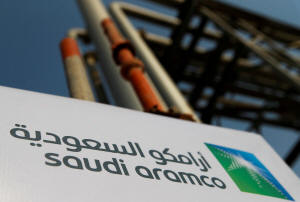Saudi Aramco boosts China investment in two refinery deals
 Send a link to a friend
Send a link to a friend
 [March 27, 2023] By
Florence Tan and Chen Aizhu [March 27, 2023] By
Florence Tan and Chen Aizhu
SINGAPORE (Reuters) -Saudi Aramco raised its multi-billion dollar
investment in China by finalising and upgrading a planned joint venture
in northeast China and acquiring an expanded stake in a privately
controlled petrochemical group.
The two deals, announced separately on Sunday and Monday, would see
Aramco supplying the two Chinese companies with a combined 690,000
barrels a day of crude oil, bolstering its rank as China's top provider
of the commodity.
Aramco said on Monday it had agreed to acquire a 10% stake in privately
controlled Rongsheng Petrochemical Co Ltd for about $3.6 billion.
The deal includes the supply of 480,000 bpd of crude oil to Rongsheng-controlled
Zhejiang Petrochemical Corp (ZPC) for 20 years, Aramco added.
It follows a preliminary agreement Aramco reached with the Zhejiang
provincial government in 2018 for a 9% stake in ZPC.

Aramco is already selling crude to the east China plant which operates
an 800,000-bpd refinery, the single largest in China, under sales
agreements renewed annually.
The Rongsheng deal comes on the heels of Aramco's agreement with Chinese
partners on Sunday for an oil refinery and petrochemical project in the
northeast Chinese province of Liaoning that is expected to start in 2026
to meet the country's growing demand for fuel and chemicals.
The Liaoning project, in the city of Panjin, will be Aramco's second
major refining-petrochemical investment in China and follows the world's
top oil exporter reporting a record profit of $161 billion in 2022.
Joint venture Huajin Aramco Petrochemical Company (HAPCO) will build and
operate the Panjin complex that will house a 300,000 barrels per day
(bpd) oil refinery and a cracker with annual production capacity of 1.65
million tonnes of ethylene and 2 million tonnes of paraxylene, Aramco
said in a statement.

UPGRADE
The Liaoning province project is expected to cost 83.7 billion yuan
($12.2 billion), partner Panjin Xicheng Industrial Group said in a
statement on Sunday.
[to top of second column] |

Saudi Aramco logo is pictured at the oil
facility in Abqaiq, Saudi Arabia October 12, 2019. REUTERS/Maxim
Shemetov/File Photo

It is an upgrade from the joint venture's plan announced in early
2022 to build a $10 billion plant that includes a 1.5 million tpy
ethylene alongside the 300,000-bpd refinery.
Construction at the Panjin complex will start in the second quarter
after the project secures the required administrative approvals,
Aramco said. The plant is expected to be fully operational by 2026,
it added.
Aramco will supply up to 210,000 bpd of crude oil as feedstock for
the plant.
State-owned NORINCO Group, a Chinese military equipment maker, owns
51% of HAPCO while Aramco and Panjin Xincheng hold stakes of 30% and
19%, respectively.
Separately, Aramco on Sunday signed a memorandum of understanding
with the southern Chinese province of Guangdong to explore
cooperation in sectors including energy, finance, research and
innovations, according to a post on the provincial government's
website.
Guangdong, China's largest provincial economy, has drawn global
firms like Exxon Mobil and BASF, each building large-scale
petrochemical complexes producing high-value chemicals.
Aramco has been ramping up its China presence. In another deal
reached last year, Aramco agreed with Shandong Energy an initial
pact to explore a potential crude supply agreement and chemical
products offtake deal.

Earlier this month, Saudi Aramco also broke ground on a $7 billion
project to produce petrochemicals from crude oil at its South Korean
affiliate S-Oil Corp's refining complex in the port city of Ulsan.
($1 = 6.8778 Chinese yuan renminbi)
(Reporting by Florence Tan and Chen Aizhu; additional reporting by
Andrew Hayley in Beijing; Editing by Sonali Paul, Christian
Schmollinger and Christina Fincher)
[© 2023 Thomson Reuters. All rights
reserved.]
This material may not be published,
broadcast, rewritten or redistributed.
Thompson Reuters is solely responsible for this content. |